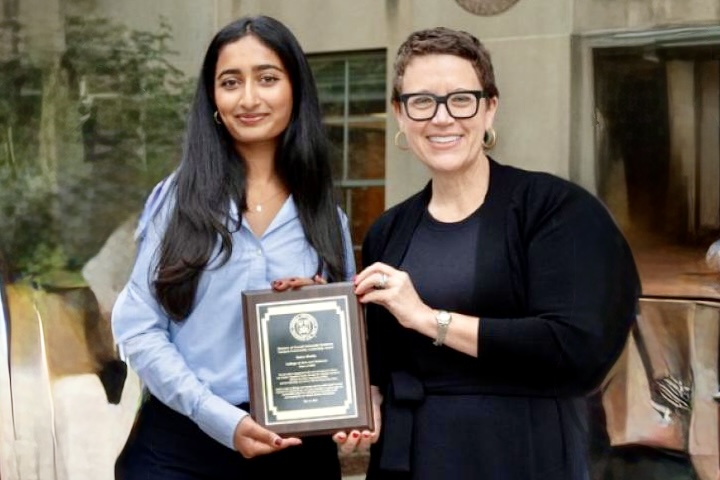Netra Shetty wins Cornell University’s Community Leadership Award

Indian American student honored for work supporting people struggling with incarceration and drug addiction across New York
By Arun Kumar
Netra Shetty, an Indian American graduating senior at Cornell University has earned the 2025 University Relations Campus Community Leadership Award for her work supporting the Ithaca community and people struggling with incarceration and drug addiction across New York.
Monica Yant Kinney, interim vice president for university relations, presented the award as Shetty’s friends and mentors looked on during a ceremony in Day Hall on May 14, according to a university release. Shetty’s parents and sister in California watched virtually.
READ: Two Indian students win 2025 MIT Supply Chain Excellence Awards (May 20th, 2025)
“Netra’s major in biology and society, and her public health-focused research on substance use and harm reduction in various high-risk communities, reflects her dedication to community health and her empathy for our shared, diverse community,” Yant Kinney said.
Shetty, a student in the College of Arts and Sciences and a Hunter R. Rawlings III Cornell Presidential Research Scholar, started working with Ithaca-based Ultimate Reentry Opportunity (URO) as a freshman and continued throughout her four years at Cornell. The organization helps people who have faced – or are currently facing – incarceration break the cycle of recidivism.
“Netra did not shy away from any of the tough realities,” said Taili Mugambee, URO lead program coordinator. “If anything, it seemed like that was the substance that kept her coming back.”
With URO, Shetty learned about the importance of collective impact and seeking input from community leaders from different sectors. Shetty also volunteered with the Ithaca Free Clinic, which provides accessible, low-barrier health care to Ithaca and the surrounding area. And she conducted research in harm reduction and the opioid crisis.
“For me, both of these experiences have shaped my perspective on the role of health care in uplifting the community,” Shetty said, “and have emphasized, for me, the importance of community engagement.”
Her research on harm reduction tools and opioid use prevention has revealed stark disparities in access to prevention methods across racial and ethnic lines. The finding could help policymakers as they combat the opioid crisis.
Nishita Dsouza, a postdoctoral research fellow at Columbia University’s Social Intervention Group, collaborated with Shetty on her research and joined the awards ceremony virtually.
“I was blown away by Netra’s capabilities to not only conceptualize these wicked problems that we’re facing as a society, but to meet them with grace, compassion and eloquence,” Dsouza said.
After Shetty graduates, she hopes to pursue a career in the medical field.

